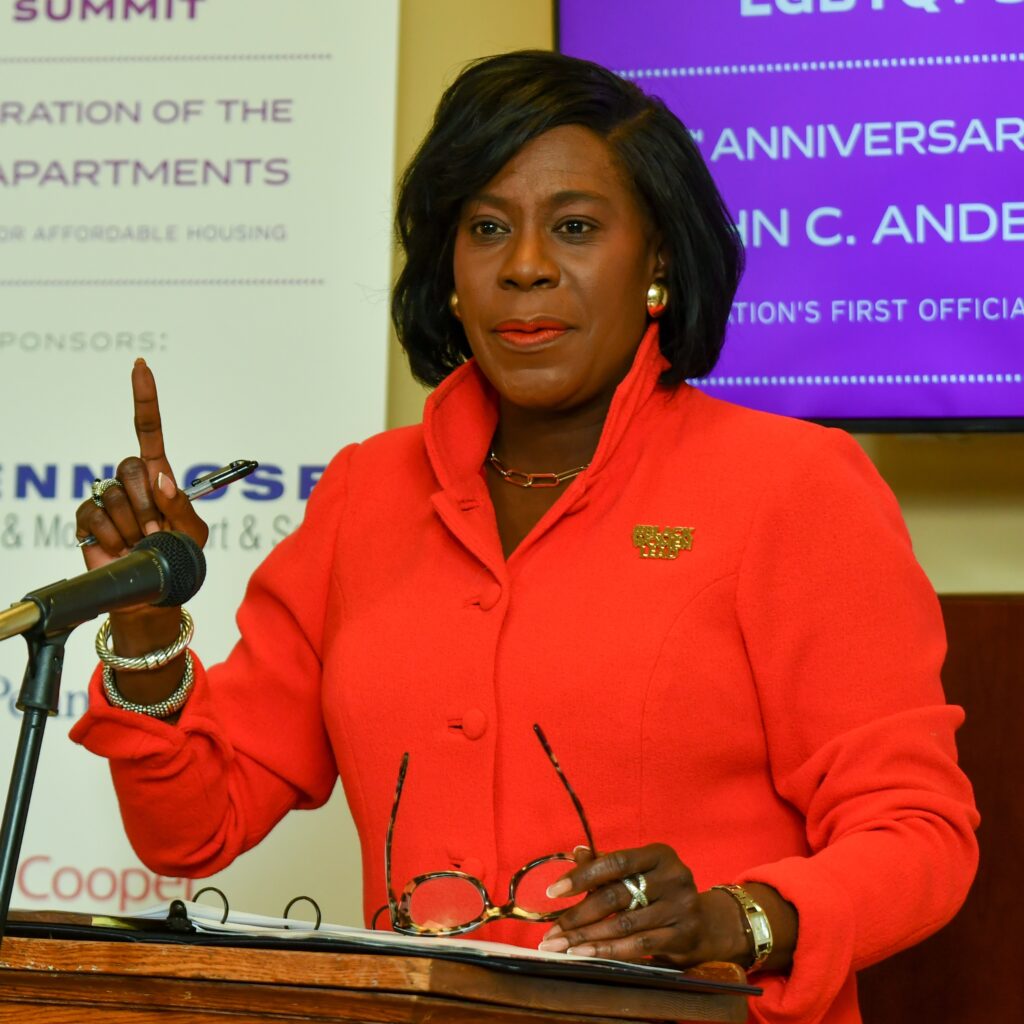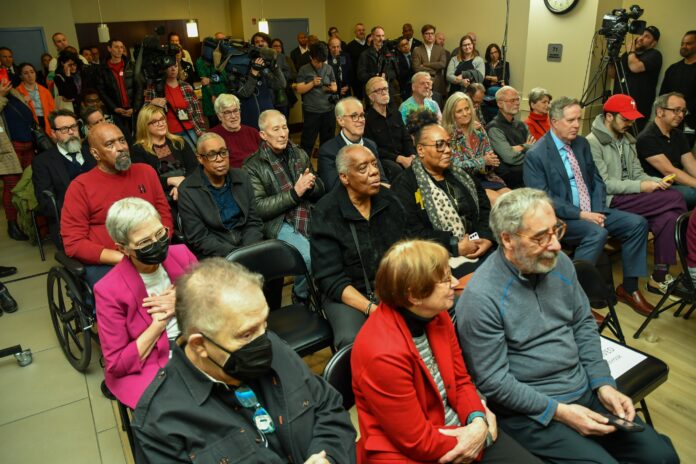A wall adjacent to the elevators in the lobby of John C. Anderson Apartments displays a black-and-white photo of demonstrators picketing in front of Independence Hall during the 1960s. Those gathered were advocating for LGBTQ+ rights that day. One of the protestors pictured in the photo is a current resident of the building, John James.
The John C. Anderson apartment complex opened 10 years ago and has housed numerous noteworthy activists throughout its first decade. Yesterday, PGN hosted its inaugural LGBTQ+ Senior Summit at the historic building to celebrate this milestone. PGN Publisher Mark Segal acknowledged the many people who have found safety and affirmation in the building — including a man who wasn’t able to come out to his family until his elder years and a lesbian couple who moved in because their previous neighbors tried to “pray the gay out of the them” whenever they entered common rooms.
That’s “why we call this a miracle building,” he said.
Leaders of local LGBTQ-centered organizations were present at the event alongside city council members, state representatives, LGBTQ+ judges, senators and other government officials.
“Sometimes, generations who pick up the baton think the movement started with them,” said Mayor Cherrelle Parker, who acknowledged the work of John James and other early activists in her speech. “While we do need to make sure that we are motivating, inspiring and encouraging next generations — newer generations, more youthful generations — to get engaged with the fight, you should never forget whose shoulders that you stand on, who started the fight before it was a popular thing to do.”
The building project, which has been replicated in 20 cities across the country, was the first to provide affordable housing for LGBTQ+ seniors.
“It is appropriate that here in the city of Philadelphia, the birthplace of democracy, that we would be first and we should have been first,” Parker said. “We have more work to do in terms of creating more affordable housing — and the partnership that made this possible is extremely important.”
“For those of us who are elected to public office — if our advocacy for you — and I mean this and I want you to take this to heart — if it doesn’t translate into tangibles like this for you, then all we’ve done is given you a good speech,” she said. “All we’ve done is set a nice slogan.”
“If we don’t tangibly deliver with what you can touch and see and feel and quite frankly experience, everything that we’ve done has been for naught,” she underlined.

“This building was built because of the special needs of LGBT seniors,” said Segal, whose lifelong commitment to activism helped to make the project possible. Despite his passion, he didn’t know how to turn the initiative into a reality — but state representatives Mike O’Brien and Mary Isaacson offered encouragement.
“‘Be pushy.’ That’s what we told Mark,” Isaacson said to the crowd, highlighting how hard LGBTQ+ people have to fight to gain access to resources and progress. She recognized John W. Kelly — a childhood friend of Mike O’Brien — who struggled with a lack of acceptance from society because he was gay. He didn’t live into adulthood, and the community space where attendees gathered was named after him in his honor.
“I hope that all of my colleagues around here that I see in this room will continue to work with me and express to this community to make sure this vision is realized again and again — here in the city, but around the country,” she emphasized.
Those involved during the planning stages sought a developer who understood their vision for the physical space and the community who would live within it. They eventually found Jacob Fisher of Pennrose Development, who noted how rewarding it was to do such “legendary” work.
“The project is also personal for me,” said Fisher, who said the work offered him a special way to remember his favorite uncle, for whom his son is named. “When I come to this building, I think of his generation and his friends, having a place to live and age in a community of their peers. I feel close to his memory in this space.”
Even though the building opened the same year marriage equality was signed into Pennsylvania’s state law, he underlined that LGBTQ+ advocacy is still necessary due to the political hostility toward queer people that persists.
“I remember thinking, maybe this building is a relic of a particular time,” Fisher said. “Maybe we’re moving away from the bigotry and intolerance that makes safe spaces like this necessary. I was wrong in so many ways.”
“I guess we all just assume we know why we’re here — but I think those who aren’t in our community should understand sort of why a building like this is so necessary,” said Micah Mahjoubian, former DMH Fund board member, who spoke about how he and his husband were coming to terms with their own aging in recent years. While he recognized that they have good jobs and financial stability, he recognized that many LGBTQ+ elders were not afforded those opportunities and don’t have that privilege.
“And so what happens when you get to the twilight of your life — and if you don’t have the support system or the financial ability to sort of take care of yourself, what are you going to do?” he said, explaining that the apartments are not a perfect solution — as residents still need to consider costs of living, including rent.
“For decades, we have been and stayed as a widespread and fierce defender of the LGBTQ community,” said John-Paul C. Hayworth, LGBTQ+ Audience Strategy Director of AARP. Hayworth acknowledged the importance of his organization’s lobbying work but noted that it’s direct collaboration with communities that has the strongest impact in protecting people who are ages 50+ “but also everyone who is going to be 50+.”
He spoke about the importance of increasing access to safe, accessible, vibrant communities — which he called “livable” communities. He underlined that the John C. Anderson Apartments has been a pioneer, serving as an example to livable communities should be like. He said this is because the feeling of “belonging” was key to the way the space was designed.
“How do we change our perspectives to normalize those age-friendly housing options?” Hayworth asked. “How do we expand our options to increase the amount of age-friendly housing options so that everyone has the opportunity to be where they want to be — rather than where they may have to be?”
“Philadelphia in particular, has made some really amazing steps in protecting the LGBTQ community from housing discrimination,” he explained. “But there’s still a lot of other ways that we need to work together to make that better for everyone.”
“So policymakers in the room — I want to make sure that you know you’re not alone. Look around you,” he said. “These are the people who have been fighting this fight. And we are still here fighting with you to make these changes.”
For photos from the LGBTQ+ Senior Summit, click here.

